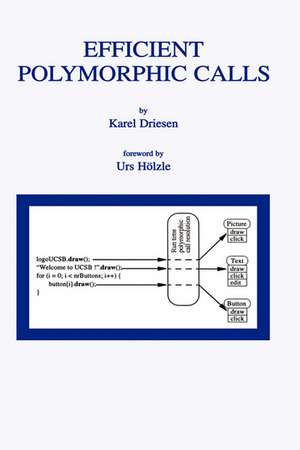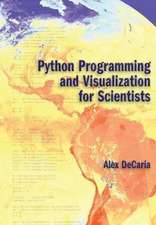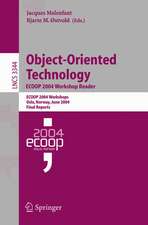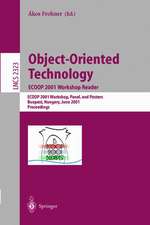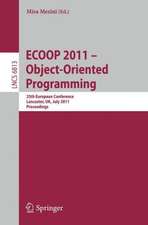Efficient Polymorphic Calls: The Springer International Series in Engineering and Computer Science, cartea 596
Autor Karel Driesenen Limba Engleză Hardback – 28 feb 2001
| Toate formatele și edițiile | Preț | Express |
|---|---|---|
| Paperback (1) | 984.18 lei 6-8 săpt. | |
| Springer Us – 26 oct 2012 | 984.18 lei 6-8 săpt. | |
| Hardback (1) | 990.48 lei 6-8 săpt. | |
| Springer Us – 28 feb 2001 | 990.48 lei 6-8 săpt. |
Din seria The Springer International Series in Engineering and Computer Science
- 24%
 Preț: 1041.98 lei
Preț: 1041.98 lei - 20%
 Preț: 643.50 lei
Preț: 643.50 lei - 18%
 Preț: 1225.62 lei
Preț: 1225.62 lei - 18%
 Preț: 965.02 lei
Preț: 965.02 lei - 20%
 Preț: 646.12 lei
Preț: 646.12 lei - 18%
 Preț: 948.79 lei
Preț: 948.79 lei - 20%
 Preț: 646.62 lei
Preț: 646.62 lei - 15%
 Preț: 637.46 lei
Preț: 637.46 lei - 20%
 Preț: 643.83 lei
Preț: 643.83 lei - 18%
 Preț: 949.23 lei
Preț: 949.23 lei - 20%
 Preț: 644.48 lei
Preț: 644.48 lei - 20%
 Preț: 994.92 lei
Preț: 994.92 lei - 20%
 Preț: 645.97 lei
Preț: 645.97 lei - 18%
 Preț: 946.87 lei
Preț: 946.87 lei - 20%
 Preț: 995.57 lei
Preț: 995.57 lei - 18%
 Preț: 956.99 lei
Preț: 956.99 lei - 20%
 Preț: 644.98 lei
Preț: 644.98 lei - 15%
 Preț: 649.54 lei
Preț: 649.54 lei - 18%
 Preț: 950.21 lei
Preț: 950.21 lei - 18%
 Preț: 1221.38 lei
Preț: 1221.38 lei - 18%
 Preț: 957.62 lei
Preț: 957.62 lei - 15%
 Preț: 643.99 lei
Preț: 643.99 lei - 18%
 Preț: 948.47 lei
Preț: 948.47 lei - 18%
 Preț: 947.35 lei
Preț: 947.35 lei - 20%
 Preț: 1284.65 lei
Preț: 1284.65 lei - 20%
 Preț: 1628.31 lei
Preț: 1628.31 lei - 20%
 Preț: 1285.78 lei
Preț: 1285.78 lei
Preț: 990.48 lei
Preț vechi: 1238.10 lei
-20% Nou
Puncte Express: 1486
Preț estimativ în valută:
189.55€ • 205.82$ • 159.22£
189.55€ • 205.82$ • 159.22£
Carte tipărită la comandă
Livrare economică 23 aprilie-07 mai
Preluare comenzi: 021 569.72.76
Specificații
ISBN-13: 9780792372899
ISBN-10: 0792372891
Pagini: 216
Ilustrații: XVII, 216 p.
Dimensiuni: 155 x 235 x 14 mm
Greutate: 0.51 kg
Ediția:2001
Editura: Springer Us
Colecția Springer
Seria The Springer International Series in Engineering and Computer Science
Locul publicării:New York, NY, United States
ISBN-10: 0792372891
Pagini: 216
Ilustrații: XVII, 216 p.
Dimensiuni: 155 x 235 x 14 mm
Greutate: 0.51 kg
Ediția:2001
Editura: Springer Us
Colecția Springer
Seria The Springer International Series in Engineering and Computer Science
Locul publicării:New York, NY, United States
Public țintă
ResearchCuprins
1 Introduction.- 1.1 Polymorphism.- 1.2 Inheritance.- 1.3 Problem statement.- 1.4 Overview.- 2 Polymorphic calls.- 2.1 Basic construct.- 2.2 Hand-crafted polymorphism.- 2.3 Object-oriented message dispatch.- 3 Software techniques for efficient polymorphic calls.- 3.1 Basic message dispatch in object-oriented languages.- 3.2 Dynamic techniques.- 3.3 Static techniques.- 3.4 Memory cost.- 3.5 Programming environment aspects.- 3.6 Summary.- 4 Row displacement compression of message dispatch tables.- 4.1 Class-based row displacement.- 4.2 Selector-based row displacement.- 4.3 Compression results.- 4.4 Optimizing table compression speed.- 4.5 interactive programming environments.- 4.6 Summary.- 5 Analysis of dispatch sequences on modern processor architectures.- 5.1 Parameters influencing performance.- 5.2 Dispatch cost calculation.- 5.3 Cost of dynamic typing and multiple inheritance.- 5.4 Influence of processor implementation.- 5.5 Limitations.- 5.6 Summary.- 6 Measurement of virtual function call overhead on modern processors.- 6.1 Virtual function tables and the thunk variant.- 6.2 Superscalar processors.- 6.3 Method.- 6.4 Results.- 6.5 Discussion.- 6.6 Summary.- 7 Hardware techniques.- 7.1 Software vs. hardware prediction.- 7.2 Hardware indirect branch prediction.- 7.3 Indirect branch frequency.- 7.4 Experimental setup.- 7.5 Problem statement.- 8 Basic indirect branch predictors.- 8.1 Branch target buffer.- 8.2 Two-level predictor.- 8.3 History buffers.- 8.4 history tables.- 8.5 Summary.- 9 Hybrid indirect branch predictors.- 9.1 Hybrid prediction.- 9.2 Branch classification.- 9.3 Dual-path hybrid prediction.- 9.4 Cascaded prediction.- 9.5 Summary.- 10 Related work.- 10.1 Software techniques.- 10.2 Polymorphic calls in Java.- 10.3 Hardware techniques.- 11 Conclusions.- 12 Glossary.- 13 References.- Appendix A Polymorphic call sequences in assembly.- Appendix B Indirect branch execution intervals.- Appendix C Basic prediction accuracy per benchmark.
